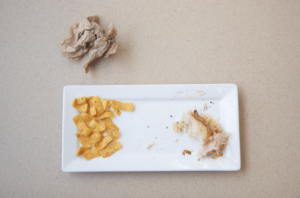by Andrea Traietti on February 13, 2020
Opinion

by Joshua Chlebowski ’21
Opinion Staff
When eating a meal at one of the various dining spots on campus, it is not uncommon for food to fall off of a plate, for a napkin to drop onto the floor, or for someone to spill something on the table. However, reactions to such occurrences say much about privilege on the Providence College campus.
There is a phenomenon here on campus where students leave behind dirty napkins or, in extreme circumstances, portions of their meal on the dining tables, with minimal to no effort made to clean them up.
While there are employees of these dining spots that carry washrags and move about cleaning the tables, they should not be responsible for disposing of large chunks of food or napkins that are left behind on the table. These employees are tasked with sanitizing rather than completing a task many of us were taught as children: if you make a mess, you clean it up.
It is not someone else’s responsibility to clean up a mess that you made and are perfectly capable of handling. Even without a washrag, there are ample napkins with which you can pick up a piece of food or wipe up a spill.
That being said, the most important part of cleaning up the mess is to dispose of the napkins used to clean it up—simply leaving them behind because “they are disgusting” or “I’ll get my hands dirty” is an unacceptable and extremely privileged viewpoint.
Just because you are not paid to clean up the dining halls does not mean your individual actions are excused. If you are able to clean up a mess, then you should be doing so, with the exception of extreme situations involving broken glass or ceramic plates.
An underlying privilege often manifests itself in minute, everyday actions—or inactions. In this case, one’s inaction demonstrates an internal belief that they are above cleaning such a mess up, and that it is beneath them to do so.
In addition to this mentality allowing for dining hall tables to remain dirtied for other students, it demeans the employees of the College who clean the facilities by insinuating that they are hired to do the “less important” jobs.
Certainly, the cleaning of tables is not glamorous by many people’s standards, but it is an extremely important task which keeps dining spaces clean and welcoming to all. It is not our place to pass judgment or shy away from dirtying our hands a little to help out fellow members of the PC community—both employees and students.
Though some forms of privilege—such as destruction of property—are active, the privilege exposed through a lack of small efforts to clean is more passive, and thus more difficult to combat.
Addressing these behaviors requires a moment of realization of the consequences of such actions, as they pertain to the community in which we live. One must put themselves in a place of critical examination as to how a shift in their actions will lead to an increasingly positive experience for those around them.
We have all at one point or another gone to sit in a specific place in a dining location on campus only to see the mess someone else left behind. What we forget to do is take this moment and guide our actions accordingly by cleaning up after ourselves. As previously stated, this does not need to be a massive undertaking, rather a conscious attempt to make a table as usable as possible for the next individuals to use it.
Privilege is a daunting and challenging topic to confront, and there are certainly many manifestations of it on our campus. The first step is recognizing our own problematic behaviors and correcting them.
The next time you find yourself eating at one of the dining spaces on campus, take a few extra seconds to clean up after yourself and encourage your friends to do the same, thus creating a community of respect while also combatting one form of the various forms of privilege seen at PC.
Comments are closed.
I really like this article, It tells me what to do and why. In my lunch room, There is one specific table that won’t clean up after themselves. They have to be forced to clean up their mess. Yesterday someone even left all of their food there! While my table, we clean up our messes with no problem. We are not always but we make messes almost everyday. It is not common but every time we do so we get some wipes and some sanitizer and clean up my mess with the table. Without being forced or asked! I Hope many people who make messes see this and think of a better way to clean up after themselves. I have seen some people who want to because they will get dirty like in the article. Our workers get dirty to clean up our mess! So it doesn’t hurt much to clean up a little bit of food or a napkins that fell on the floor. I hope when my class sees this, they will learn a little lesson
Such good principles discussed in this article. In life we must strive to tidy after self. It doesn’t come natural for me, my mind way ahead of where I physically am. Yet, cleanup efforts later only compounds the situation. Gina from fatfitanfab.com there are also great articles about responsibility on jw.org